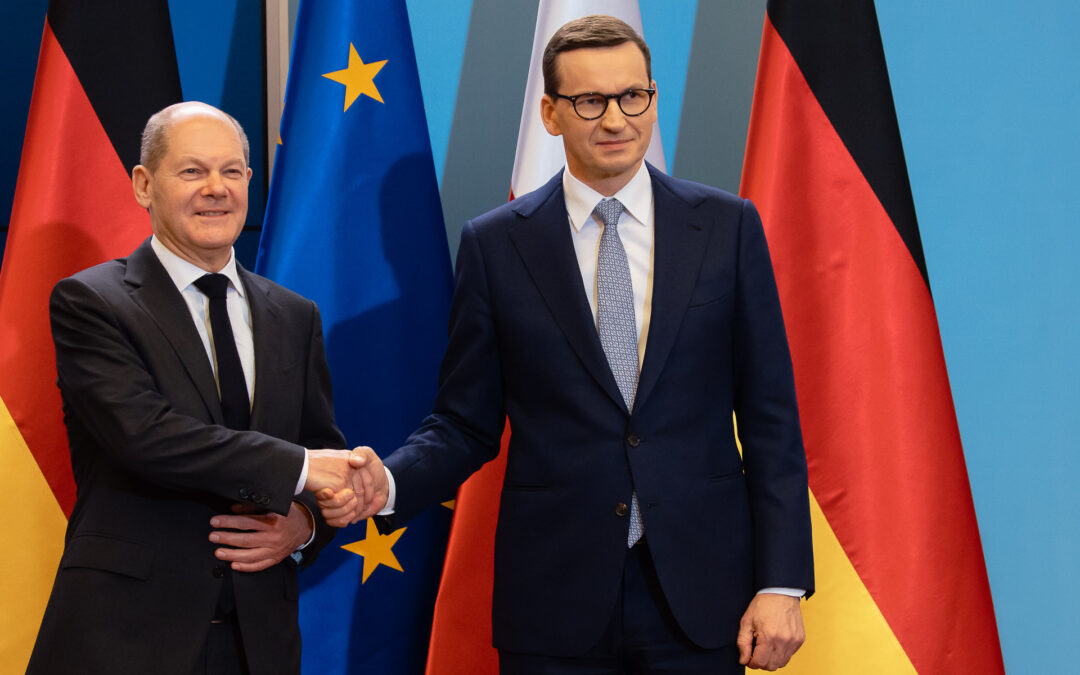Germany’s new chancellor, Olaf Scholz, visited Warsaw yesterday to meet with the Polish prime minister, Mateusz Morawiecki. The heads of government discussed their differences over the Nord Stream 2 gas pipeline and war reparations.
The two leaders also agreed on the need to find a “pragmatic solution” to Poland’s rule of law dispute with the European Union, as well as to stop the migration crisis on the EU’s border with Belarus.
📸 Wizyta kanclerza Republiki Federalnej Niemiec Olafa Scholza w #KPRM. pic.twitter.com/B9bKZ7kVEr
— Kancelaria Premiera (@PremierRP) December 12, 2021
Poland is the third country on Scholz’s tour of European capitals since becoming chancellor, following Paris and Brussels, with the German chancellor saying it was “important for him to pay a visit to Poland in the first week in office”.
It is a “signal that you will want to cooperate with us as closely as possible”, said Morawiecki. “Today we are opening a new chapter in Polish-German relations because we have a change of government on the German side,” he told Scholz, who took over from Angela Merkel after her 16 years in government.
Scholz expressed “great happiness” that the two countries could now work together as “neighbours and friends” despite “these terrible chapters of history, the terrible crimes that the Germans brought on Poland”.
The leaders discussed the thorny issue of Poland’s fraught relations with the European Union. Scholz called for a “pragmatic solution” to the rule of law conflict, which has resulted in Poland facing daily fines from the Court of Justice of the European Union and seeing €36 billion in pandemic recovery funds being delayed.
“We would be pleased if there was a common understanding between the [European] Commission and the Polish side, and we will still be connected by the values of democracy and rule of law,” he said.
“We would like to express our joint desire that the disputed issues be resolved as swiftly as possible,” said Morawiecki. “I have presented our perspectives and solutions to the chancellor and we will see how this develops.”
Scholz’s decision to make such a cordial visit to Warsaw, despite the Polish government so far refusing to back down in the rule of law dispute, has led to some criticism back at home.
“The government in Warsaw, in particular, gives other EU countries a headache,” wrote Markus Becker and Martin Knobbe in German news magazine Der Spiegel on Sunday. “It is not only harassing judges and minorities in its own country, but has recently been questioning the entire legal order of the EU.”
“Scholz nevertheless rewards the national-conservative PiS government by designating Warsaw as the third destination of his first visits, after Paris and Brussels,” they added.
Morawiecki also reiterated his country’s opposition to Nord Stream 2, a pipeline bringing gas directly to Germany Russia while bypassing Central and Eastern Europe. Morawiecki noted this would expose the region, especially Ukraine, to “energy blackmail” by Russia.
Berlin has recently faced pressure from the United States to include the pipeline in any potential sanctions as a Russian military build-up on Ukraine’s border has worried Western leaders.
Scholz responded that Germany felt “responsible” for ensuring that the gas transit business is a “successful business for Ukraine in the future” and “will take care of that”.
The pair also disagreed on the issue of reparations for damage inflicted on Poland by Germany during the Second World War. The Polish government has claimed that Poland is owed as much as hundreds of billions of dollars.
There had recently been hopes on the Polish side that the new German coalition would be more open to the idea. But in Warsaw yesterday, Scholz upheld the previous government’s line, which is that the issue has already been legally settled.
“You know the German attitude,” he said. “We have concluded treaties that are valid and have settled the past issues and the compensation.” Germany “continues to be willing to pay very, very high contributions to the EU budget,” he added.
Poland’s prime minister said that he had also raised the “artificially induced migration crisis” on Poland’s border with Belarus. He noted that “the vast majority” of migrants – who are mainly from the Middle East – are heading to Germany, the Netherlands and France by way of Poland.
“So, while defending the eastern border of the European Union, we are also defending the German border, as well as the free movement of goods and the openness of the Schengen border,” he said.
Scholz, like his predecessor, noted that Belarusian ruler Alexander Lukashenko has been “instrumentalising migrants and refugees” and “striking against human dignity”. He pledged support for Poland in opposing Belarus’s “hybrid actions” and declared that “our common task is to end this”.
The meeting yesterday followed a visit on Friday by Germany’s new foreign minister Annalena Baerbock on the third leg of her first official trip abroad, which previously also saw her travel to Paris and Brussels.
In a similar spirit, discussions with her Polish counterpart acknowledged diverging interests of the two countries, with Zbigniew Rau repeating Poland’s calls for war reparations and demanding that Germany shut down the Russian Nord Stream gas pipelines.
Baerbock, co-leader of the Greens, who are in coalition with Scholz’s SPD, has been more sympathetic towards Poland’s stance on energy security. On Sunday she told German broadcaster ZDF that the Nord Stream project did not clear the EU’s energy laws and security questions remained.
Main image credit: Krystian Maj/KPRM/Flickr (under CC BY-NC-ND 2.0)

Maria Wilczek is deputy editor of Notes from Poland. She is a regular writer for The Times, The Economist and Al Jazeera English, and has also featured in Foreign Policy, Politico Europe, The Spectator and Gazeta Wyborcza.




















